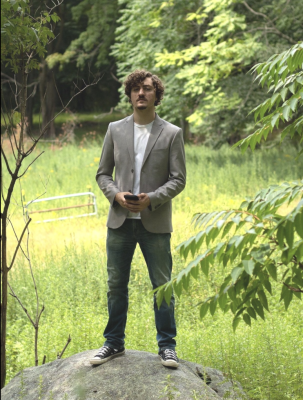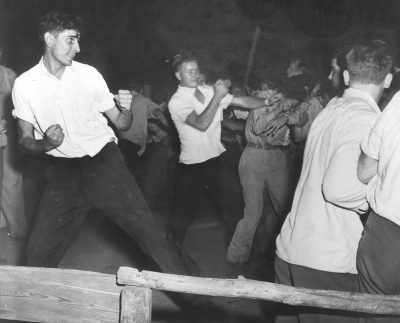Filmmaker Documents Robeson and Forgotten History of the Peekskill Riots
News Based on facts, either observed and verified directly by the reporter, or reported and verified from knowledgeable sources.
By Barbara Kay

An important but largely forgotten piece of 20th century American history unfolded in Peekskill in the summer of 1949. Now a local filmmaker and historian has taken an in-depth look at what happened in what is sometimes considered the unofficial start of the McCarthy anti-communist era.
Jon Scott Bennett released the first episode of his five-part docuseries, “The Peekskill Riots,” last Friday, the story of how a misquote attributed to Paul Robeson, the acclaimed singer, actor and activist, sparked a riot on Aug. 27 and Sept. 4 after he arrived for a local concert.
Bennett, a Manhattanville College graduate with a bachelor’s degree in history, began working on the documentary two years ago, his most extensive project. Bennett also made films about the Pound Ridge Massacre and the Leatherman.
“The more I discovered on the (riots) the more I realized how much time and care needed to go into this, not to say I didn’t with previous topics, but the Pound Ridge Massacre and Leatherman were brief chapters of history or had so few sources talking about it that there wasn’t much to explore on, so I was able to do that research and do the editing in a comparatively short amount of time to this,” Bennett said.
In his childhood, Bennett made films with “nerf guns and friends running around the woods,” but was encouraged by friends and family to continue his passion into adulthood.
“I was so obsessed with (the Pound Ridge Massacre), I would tell all my friends and family and go on and on and read as much as I could, and at some point, some of my friends were like ‘You should make a video about that,’ in a supportive gesture, but also to do something else with this because you’re boring us to death,” he joked.
In his search for his next project, Bennett discovered material pertaining to the Peekskill riots. While engrossed with the story, frustration settled in as he learned more. The riots had been largely swept under the rug by the community.
“Suddenly this entire chapter of history opened up to me and the deeper I dug, the more amazed at how much content and material there was,” he said. “As fascinated as I became, I became equally as frustrated as to how I’ve never heard of this. How was this something that’s not being talked about?”
The riots took place on Aug. 27 and Sept. 4, 1949. Robeson was headlining a concert to promote peace in a time of “bubbling tension,” Bennett said, of the burgeoning Red Scare and the approaching McCarthy era.
Robeson had been asked to give an impromptu speech at the World Peace Conference in Paris, where the Associated Press falsely quoted Robeson saying that Blacks would not fight against the Soviet Union.
“According to Paul Robeson Jr., they took certain elements of things he said in this concert tour in Europe and took a statement here and a statement there and pieced it together,” he said. “That statement at that time never happened, and it was what was reported.”
But the damage had been done. Many Americans, particularly veterans, were appalled. Upon learning that Robeson would be performing in Peekskill, protesters organized and violence ensued. The first concert was scheduled for Aug. 27, but was postponed because rioting broke out. It was rescheduled for Sept. 4.

Bennett said that the veterans who attended the concert and supported and protected Robeson, had their “heroism questioned for supporting a commie.”
“One of the veterans in particular, who led the protests, Vincent Boyle, would use the Peekskill Evening Star newspaper as his platform to promote this protest against Robeson,” Bennett said.
Boyle would play on people’s fears, saying that the concert, held across from Hillside Cemetery, was where his brother was buried after being killed in World War II.
“It (was) emotional manipulation and those tactics worked,” Bennett said.
While the location was picked because of its picnic tables, Peekskill residents threw rocks at the concertgoers, many of which were their neighbors. They smashed car windows, attacked attendees with brass knuckles and clubs. Shouting obscenities and slurs, the rioters hung Robeson in effigy.
The concert was rescheduled at Hollow Brook Country Club, which went on without interruption. Afterward, though, the violence continued and escalated.
The first episode of the docuseries focuses on the historically underappreciated accomplishments of Robeson, Bennett said.
In his commitment to tell the story, he reached out to Frank Goderre, a former Peekskill city historian and the owner of the largest photo collection of the riots. He provided photos and other material for the docuseries.
“I gave him everything I had, news articles, over 300 archived images and any other written books on the riots,” Goderre said. “I think he’s extremely brilliant and will bring to the public a totally different view of this incredible man, Paul Robeson. I’m 75 years old and it’s time to pass the torch to a young generation. I can’t wait to see the other parts of the documentary.”
The first episode, nearly 49 minutes long, aired last Friday on YouTube and is available at www.JonScottBennett.com. The remaining episodes are being released bimonthly. There will also be a screening of the first episode at The Field Library in Peekskill on Saturday Mar. 30 at 2 p.m.
Updates can be found on Bennett’s Instagram account (@jonscottbennett) and website.

Examiner Media – Keeping you informed with professionally-reported local news, features, and sports coverage.
